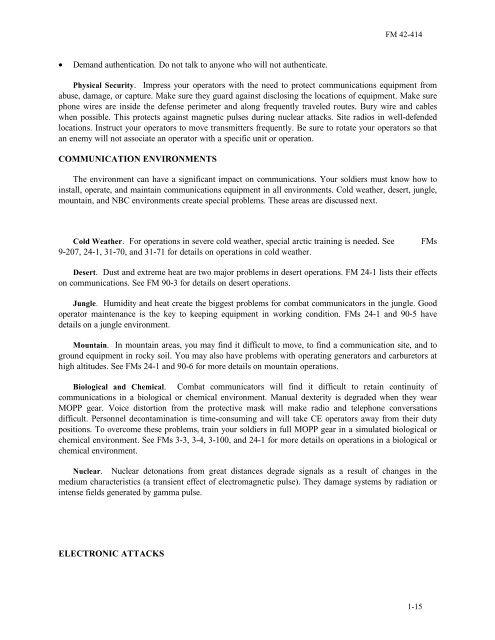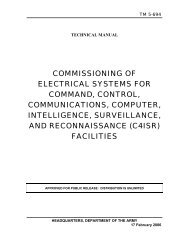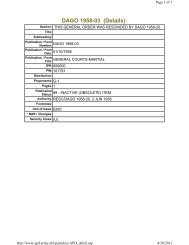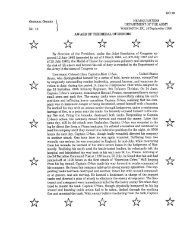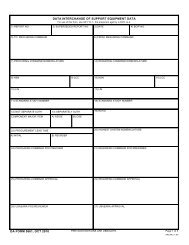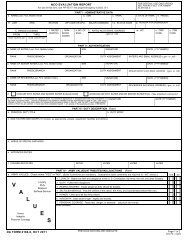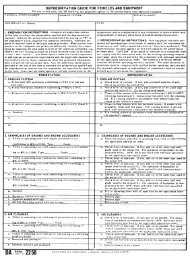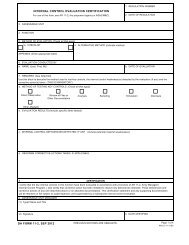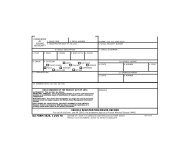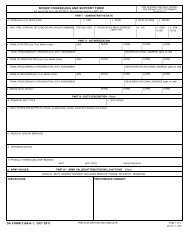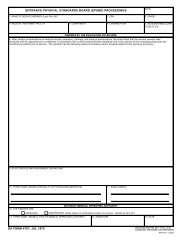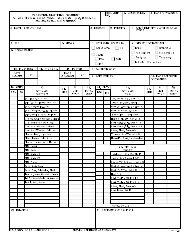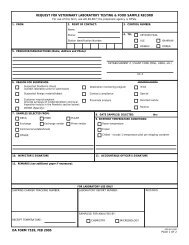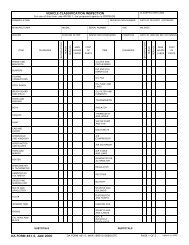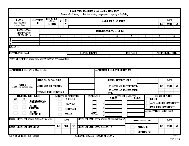Tactics, techniques, and procedures for - Army Electronic ...
Tactics, techniques, and procedures for - Army Electronic ...
Tactics, techniques, and procedures for - Army Electronic ...
You also want an ePaper? Increase the reach of your titles
YUMPU automatically turns print PDFs into web optimized ePapers that Google loves.
• Dem<strong>and</strong> authentication. Do not talk to anyone who will not authenticate.<br />
FM 42-414<br />
Physical Security. Impress your operators with the need to protect communications equipment from<br />
abuse, damage, or capture. Make sure they guard against disclosing the locations of equipment. Make sure<br />
phone wires are inside the defense perimeter <strong>and</strong> along frequently traveled routes. Bury wire <strong>and</strong> cables<br />
when possible. This protects against magnetic pulses during nuclear attacks. Site radios in well-defended<br />
locations. Instruct your operators to move transmitters frequently. Be sure to rotate your operators so that<br />
an enemy will not associate an operator with a specific unit or operation.<br />
COMMUNICATION ENVIRONMENTS<br />
The environment can have a significant impact on communications. Your soldiers must know how to<br />
install, operate, <strong>and</strong> maintain communications equipment in all environments. Cold weather, desert, jungle,<br />
mountain, <strong>and</strong> NBC environments create special problems. These areas are discussed next.<br />
Cold Weather. For operations in severe cold weather, special arctic training is needed. See FMs<br />
9-207, 24-1, 31-70, <strong>and</strong> 31-71 <strong>for</strong> details on operations in cold weather.<br />
Desert. Dust <strong>and</strong> extreme heat are two major problems in desert operations. FM 24-1 lists their effects<br />
on communications. See FM 90-3 <strong>for</strong> details on desert operations.<br />
Jungle. Humidity <strong>and</strong> heat create the biggest problems <strong>for</strong> combat communicators in the jungle. Good<br />
operator maintenance is the key to keeping equipment in working condition. FMs 24-1 <strong>and</strong> 90-5 have<br />
details on a jungle environment.<br />
Mountain. In mountain areas, you may find it difficult to move, to find a communication site, <strong>and</strong> to<br />
ground equipment in rocky soil. You may also have problems with operating generators <strong>and</strong> carburetors at<br />
high altitudes. See FMs 24-1 <strong>and</strong> 90-6 <strong>for</strong> more details on mountain operations.<br />
Biological <strong>and</strong> Chemical. Combat communicators will find it difficult to retain continuity of<br />
communications in a biological or chemical environment. Manual dexterity is degraded when they wear<br />
MOPP gear. Voice distortion from the protective mask will make radio <strong>and</strong> telephone conversations<br />
difficult. Personnel decontamination is time-consuming <strong>and</strong> will take CE operators away from their duty<br />
positions. To overcome these problems, train your soldiers in full MOPP gear in a simulated biological or<br />
chemical environment. See FMs 3-3, 3-4, 3-100, <strong>and</strong> 24-1 <strong>for</strong> more details on operations in a biological or<br />
chemical environment.<br />
Nuclear. Nuclear detonations from great distances degrade signals as a result of changes in the<br />
medium characteristics (a transient effect of electromagnetic pulse). They damage systems by radiation or<br />
intense fields generated by gamma pulse.<br />
ELECTRONIC ATTACKS<br />
1-15


